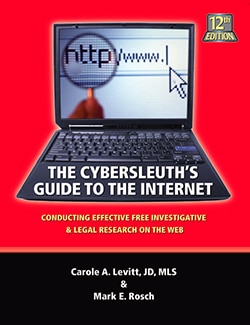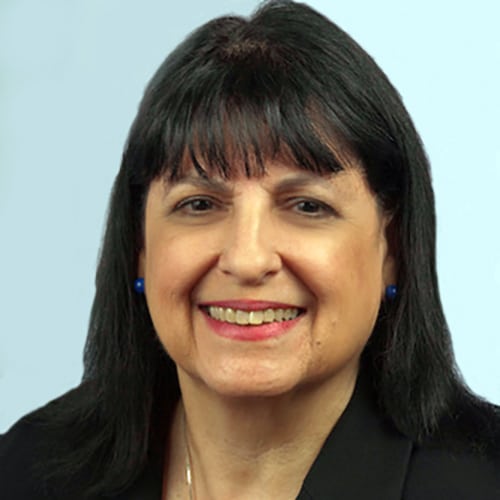When you’re in need of an expert to serve as a witness in your case, to consult on a special matter, or perhaps even to serve as a speaker at your bar seminar, where do you look? Your first instinct may be to use a search engine, or to search a social networking site like LinkedIn, Facebook or Google+. But there are other, deeper places on the Web to find that one right expert you truly need.
Today, in this special excerpt from The Cybersleuth’s Guide to the Internet (now in its 12th edition), Carole Levitt and Mark Rosch give us the scoop on where to head.
Searching National Expert Witness Directory Databases
There are many types of free sites where you can find experts. A logical place to begin is at a national expert witness directory database. These sites may include the expert’s profile, curriculum vitae, deposition transcripts, references, trial transcripts and articles.
Jurispro.com is a free expert witness database with a unique feature. The site gives you the ability to view an expert’s photograph and listen to his or her voice. The expert’s CV, background, publications and references are also included, in addition to a link to the expert’s own website (where applicable) and an email contact form.
ALMexperts.com has a database searchable by name or company, area of expertise, or keyword. Search results can include the experts’ profile, resume, picture, link to their website, educational/licenses information, and an email contact form.
Experts.com’s directory lists experts in over 1,200 categories. Results include a profile of the expert, contact information, links to the expert’s website, CV and email. Search criteria are similar to Jurispro and ALMExperts, but the search results offer less detail than those other sites. Some results also include links to books or articles the expert has written.
MoreLaw also has a free directory of experts, browseable by state, city and area of expertise or searchable by name, company, phone number, description, etc., although results include the least information of the directories discussed here. Profiles include contact information, website and email links, and a description of the expert’s areas of expertise.
Searching Law Association Websites
Many specialty law association websites sponsor expert witness directories, though be aware that accessing them usually requires paid membership in the association. The Defense Research Institute (DRI), for example, offers an expert witnesses database free to its members (who are all defense attorneys), searchable by expert name, expertise and locale.
There’s also TrialSmith, a subsidiary corporation of the Texas Trial Lawyers Association. It offers a database where plaintiff’s attorneys can access an online litigation bank with more than a half-million deposition transcripts and more than 2.2 million other database items that reference experts and case topics. Access to TrialSmith’s collection is available only to the plaintiff’s bar. Annual subscription fees vary depending on membership in one of the site’s nearly 90 partner associations. You can click on “Services” on the site’s home page and then “Subscription Plans” from the subsequent drop-down menu for more details.
Many state and county bar associations also offer expert witness directories on their websites, often for free. For example, the Illinois State Bar Association offers a browseable list of experts organized by category, while the Los Angeles County Bar Association’s database, Expert4law, offers a directory of experts, private judges, consultants, researchers and more searchable by keyword, category, name, or company.
Searching Other Association Sites
Another useful way to locate an expert, especially when it’s an unusual expertise, is to get a referral from an association based on the particular field of expertise with which you are dealing. There’s an expert in every field—and there’s an association for every field, or so it seems.
If you know the association’s exact name, you can use a search engine to find its website, of course. If you don’t know the exact name of an association (or if you are unsure whether one even exists), you can still use a search engine and enter the topic of the association—e.g., banana—and the word association. (By the way, there are at least five associations related to the banana.)
There is also Guidestar, a useful databases you can keyword search. It has information on more than 1.8 million nonprofit associations searchable by organization name, location or keywords. Access to basic information from the results is available with a free registration. When available, information behind the People tab can be most useful in identifying potential experts or in supplying referrals to potential experts.
Searching a Product Directory or University Website
Another way to locate experts is to locate companies in the industry in which you need an expert. This is useful when you need to find an expert knowledgeable about a specific product but you don’t know who manufactures it, or you are looking to locate an expert from a particular company’s rival. ThomasNet.com allows you to search for companies by company name, product/service or brand.
In addition, college professors often make good experts, and you can go to their university’s website for a look at their CVs, courses they’ve taught, and articles or books they’ve published. Links to college and university home pages can be found at the Index of American Universities. Often the institution will have a search page to locate experts among its faculty that is searchable by subject or name.
Using Jury Verdict, Settlement, Case Law and Brief Bank Websites
Sometimes the best way to find experts is by searching through documents (such as jury verdicts, settlements, case law and brief banks) where they have been mentioned as the expert of record. Some options:
- MoreLaw.com provides a free jury verdicts and settlements database. To locate experts who have previously testified in cases similar to one that you are handling, search by keywords describing your case.
- Law.com has a pay database, VerdictSearch.com, of over 170,000 jury verdicts. Annual subscription prices are based on law firm size.
- JuryVerdicts.com is maintained by The National Association of State Jury Verdict Publishers. It links to the sites of the organization’s members that publish jury verdict summaries throughout the United States. You must follow the links to the publishers that cover the jurisdictions in which you’re searching. Fees to access summaries of the cases, jury verdicts, or awards in which the experts testified vary from publisher to publisher. Access to the site’s expert witness directory is free. However, it is only browseable by the last names of experts (culled from jury verdicts).
Carole Levitt is a lawyer, law librarian and legal educator with more than 30 years in the legal field. She served as Chair of the Executive Board of the California State Bar Law Practice Management Section’s Executive Council.
Mark Rosch is a frequent speaker on the topics of Internet research and using technology more effectively in the practice of law. Together, they have conducted hundreds of in-person MCLE programs for bar associations, law firms, corporations and other professional organizations.
Reprinted with permission from The Cybersleuth’s Guide to the Internet, 12th Edition.
Illustration ©Image Zoo.

















